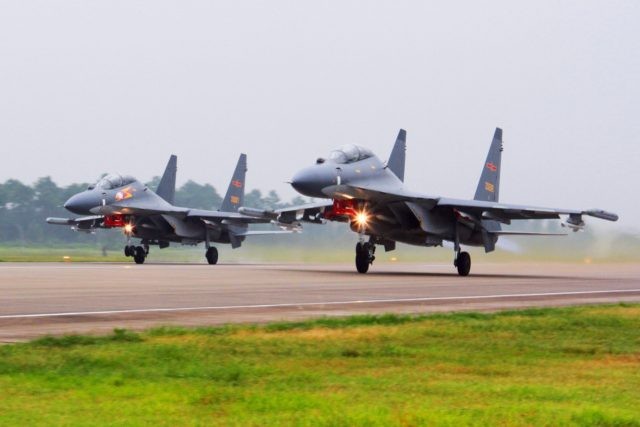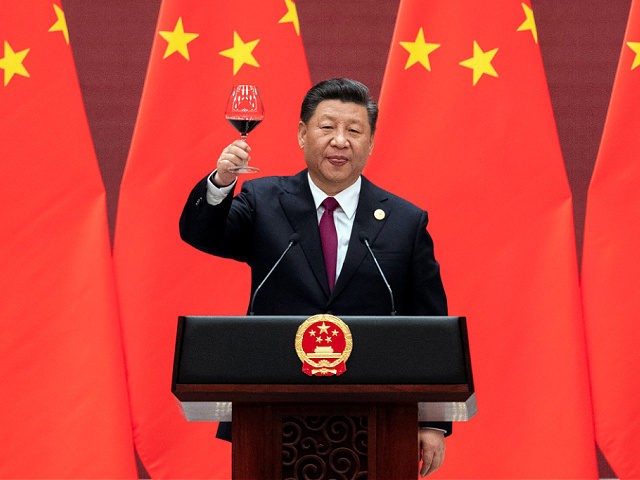US raises concern as China flies warplanes south of Taiwan

The Chinese military flew 16 warplanes over waters south of Taiwan on Sunday as the United States expressed concern about what it called China’s “provocative military action” near the self-governing island that China claims
US raises concern as China flies warplanes south of TaiwanThe Associated PressTAIPEI, Taiwan
TAIPEI, Taiwan (AP) — The Chinese military flew 16 warplanes over waters south of Taiwan on Sunday as the United States expressed concern about what it called China’s “provocative military action” near the self-governing island that China claims.
China sent 38 warplanes into the area on Friday and 39 aircraft on Saturday, the most in a single day since Taiwan began releasing reports on the flights in September 2020. The flights came in daytime and nighttime sorties, and it wasn’t clear if China was planning more flights on Sunday night.
A statement from U.S. State Department spokesperson Ned Price warned that China’s military activity near Taiwan risks miscalculation and undermines regional peace and stability.
“We urge Beijing to cease its military, diplomatic, and economic pressure and coercion against Taiwan,” the statement said.
It added that the United States, Taiwan’s biggest supplier of arms, would continue to help the government maintain a sufficient self-defense capability.
China and Taiwan split in 1949 during a civil war in which the Communists took control of mainland China and the rival Nationalists set up a government on Taiwan, an island of 24 million people about 160 kilometers (100 miles) off the east coast.
China has been sending military planes into the area south of Taiwan on a frequent basis for more than a year. Taiwan’s Defense Ministry said 12 fighter jets and four other military aircraft entered Taiwan’s air defense identification zone on Sunday.
___
Associated Press journalist Matthew Lee in Washington, D.C., contributed to this report.
Report: Belt and Road Projects Make Money for China, Leave Third World Partners in Debt

A report published Wednesday by the AidData project at the College of William & Mary in Virginia found that China’s Belt and Road Initiative (BRI), touted by Communist China as a partnership to help emerging economies, has mostly profited China while leaving its “partners” mired in crushing debt.
The report, entitled Banking on the Belt and Road, is billed as a “uniquely comprehensive” review of over 13,000 BRI projects spread across 165 countries over 18 years.
“China has used debt rather than aid to establish a dominant position in the international development finance market,” the authors concluded, contrasting BRI with more charitable efforts like the Organization for Economic Cooperation and Development (OECD).
AidData said China’s huge BRI loans have mostly been provided on “less generous terms than loans from OECD,” with an average 4.2 percent interest rate compared to about 1 percent for OECD. China’s loans also have much shorter repayment windows, averaging less than 10 years versus 28 for OECD.
The report noted that China’s overseas loans are growing even less generous as the projects grow larger and more risky, with more demands for credit insurance and collateral.
The collateral demanded by Chinese banks just happens to include resources China is hungry for:
To secure energy and natural resources that the country lacks in sufficient quantities at home and maximize investment returns on surplus dollars and euros, Chinese state-owned creditors have rapidly scaled up the provision of foreign currency-denominated loans to resource-rich countries that suffer from high levels of corruption
BRI has a penchant for lending vast sums to state-owned enterprises in developing nations, which in turn have a habit of disappearing from the balance sheets of those national governments, and enjoy “explicit or implicit forms of host government liability protection.” This means the true size of Chinese loans is often hidden from the public in partner nations, and from international financial agencies.
“Chinese debt burdens are substantially larger than research institutions, credit rating agencies, or intergovernmental organizations with surveillance responsibilities previously understood,” AidData observed.
“42 countries now have levels of public debt exposure to China in excess of 10% of GDP,” the report revealed. In fact, eight of those countries have debt to China that exceeds 30% of their GDP.
These hidden-debt issues have occasionally come as unpleasant surprises to new governments after the leaders who cut deals with China get voted out of office. A striking current example is Zambia, where recently-elected President Hakainde Hichilema discovered the debts to Chinese banks run up by his predecessor Edgar Lungu were twice as big as the $3 billion Lungu admitted to. Zambia defaulted on its sovereign debts late last year.
Beyond the dismaying details of their financing, BRI projects have a history of “major implementation problems,” ranging from corruption to environmental disasters. BRI projects take an unusually long time to implement, and have an extraordinarily high chance of getting canceled before completion – especially if the work is managed by Chinese firms, rather than being overseen by the host countries or third parties.
“China is a banker, not a benefactor,” AidData director Brad Parks told Voice of America (VOA) on Friday.
“China’s state-owned banks are profit-maximizing surrogates of the state. They are hunting for revenue-generating, profitable projects. There may be some ancillary economic development or social welfare benefit for host countries, but that’s not the primary motivation,” Parks said.
One topic where the AidData report went easier on China than many other critics was “debt trap diplomacy,” which theorizes that China cajoles developing nations into taking out loans it knows they cannot repay, so China can swoop in and seize their national assets.
Parks said his group’s research suggested China prefers “collateralizing its loans with liquid assets rather than physical infrastructure,” although some spectacular examples of physical collateral have made headlines over the past few years.
When looking at thousands of BRI projects spread across many countries, rather than a few geopolitical hot potato examples, AidData concluded Chinese bankers generally believe they can make a profit from their loans.
“It was extremely rare to see Beijing collateralizing on a physical illiquid asset. They are savvier than that. What they prefer to do is to collateralize on cash, fully liquid, grab-and-go assets,” Parks said.
What China does like to do is create a circular financing arrangement where it essentially uses the debt from resource-rich Belt and Road countries as coin to buy what Beijing wants:
One common repayment arrangement, Parks said, involves contracts for delivery of a country’s natural resources. At the same time that it issues a loan, Beijing will arrange a parallel agreement for ongoing purchases of resources produced by the host country. However, when it takes delivery of the resources, Beijing “pays” for it by depositing money in an account that it controls, and uses those funds to collect scheduled loan payments.
AidData found a good deal of “buyer’s remorse” among BRI clients, who find many of the projects more costly, slower to complete, and less beneficial than anticipated. Western nations are having some success at wooing unhappy BRI customers away from China, although the AidData report noted that China still “outspends the U.S. and other major powers on a 2-to-1 basis” on international development projects.
“If Beijing wants to sustain support for the initiative, it needs to move quickly and decisively to address this kind of rising discontent among Belt and Road participant countries, and it needs to watch its flank, because there’s soon going to be greater choice in the infrastructure financing market,” Parks suggested.
No comments:
Post a Comment